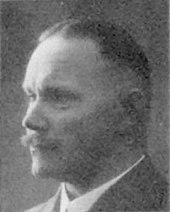Matthias Neyses
Matthias Neyses (born July 9, 1872 in Meckel , † September 10, 1946 in Bitburg ) was a German farmer and agricultural politician (Center Party).
From 1878 to 1886 Neyses attended primary school in Meckel in the Trier district . He then worked in agriculture.
Politically, Neyses began to get involved in the Center Party during the Empire . In 1918, while the Hohenzollern monarchy was still in existence, he became a member of the Prussian House of Representatives. After the fall of the monarchy in autumn 1918, Neyses entered the Weimar National Assembly in 1919 . He then sat from 1920 to 1933 as a member of the constituency 24 or - after renumbering the constituencies in 1924 - the constituency 21 (Koblenz-Trier) as a member of the Berlin Reichstag . In March 1933 Neyses was one of the members of the Reichstag who voted for the so-called Enabling Act , which formed the legal basis for the establishment of the Nazi dictatorship.
In addition, Neyses was a member of the district committee and the district council of Bitburg as well as a member of the committee for cattle breeding and dairy of the Rhenish Chamber of Agriculture.
literature
- Albert Endres: Matthias Neyses - member of the Reichstag and agricultural politician of the Weimar Republic . In: Kurtrierisches Jahrbuch . 1999, pp. 427-438
- Albert Endres: Matthias Neyses. Life path and personality in personal testimonies . In: Heimatkalender Landkreis Bitburg-Prüm , 2001, pp. 105–112
Web links
- Matthias Neyses in the database of members of the Reichstag
| personal data | |
|---|---|
| SURNAME | Neyses, Matthias |
| BRIEF DESCRIPTION | German farmer and agricultural politician (Center Party) |
| DATE OF BIRTH | July 9, 1872 |
| PLACE OF BIRTH | Meckel |
| DATE OF DEATH | September 10, 1946 |
| Place of death | Bitburg |
